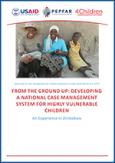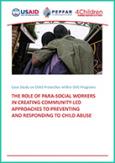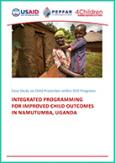Case Studies | June 15, 2017
Summary of Key Findings from the 4CHILDREN Case Management Case Studies
PEPFAR’s OVC programming delivers child-focused, family-centered interventions that seek to improve well-being and prevent and mitigate the impact of HIV and AIDS on children and families. This effort involves working in partnership with children and families to identify, plan, and complete a series of actions in an effort to achieve specific goals. This process is typically referred to as case management. 4Children has prepared a series of case studies documenting the core components of the case management process within orphans and vulnerable children (OVC) programming and national child protection systems, in three different countries: The Yekokeb Berhan Project in Ethiopia, the Sustainable Comprehensive Responses for Children and their Families (SCORE) Project in Uganda, and the National Case Management System (NCMS) in Zimbabwe, developed with support of the Vana Bantwana Initiative.
These case studies, developed through an extensive process of consultation with USAID and implementing partners, review of programming reports, country-specific documentation and other literature, and in-depth field work, aim to provide examples of how case management can be used to support work with vulnerable children and families affected by or living with HIV. The experiences, approaches, and tools used by the three different programs share some commonalities as well as challenges and lessons learned. However, they also provide unique examples of how to build on or integrate case management into existing systems and structures at local and national levels, and how to integrate a case plan achievement approach into OVC programming. As the sector begins to embrace the role that a case management process has within OVC programming, these case studies provide concrete examples of how to design and implement case management, including recognition of the challenges that accompany this process.
- Objectives of the Case Management Case Studies
- Selection of the Case Studies
- Methodology
- Case Management within OVC Programming
- Shifting expectations for OVC programs
- Strengths and successes
- Case management systems are designed for and adapted to the local context, institutions, and policy frameworks
- Case management systems are linked to and promote strong referral mechanisms
- Gaps and challenges
- Case management systems can be strengthened to better target and reach HIV-affected children and families, especially children living with HIV, to support the 90-90-90 effort
- Vulnerability assessments are too subjective in some cases, and tend to focus on problems rather than strengths and resources
- Case planning does not systematically facilitate household participation, commitments, or goal setting
- The concept of case plan achievement is not readily understood or applied in a consistent manner
- Considerations for case managementin OVC programming
- Continued focus on human resources and the social service workforce
- Strengthening the HIV lens within OVC case management systems
- Utilizing the three pathways out of OVC programming for improved case management planning
- Conclusion: The case for contextualizing and institutionalizing a case management process within OVC programs
- Documents reviewed





